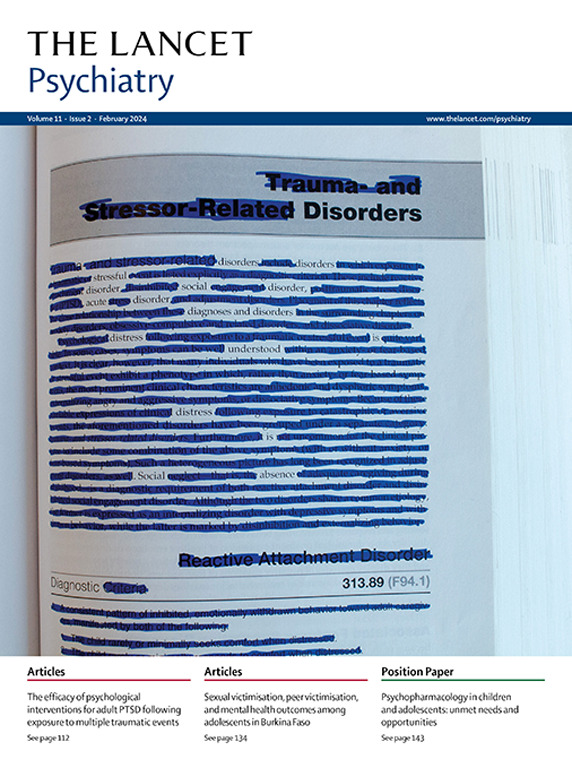冰岛锂疗法患者罹患慢性肾病的风险:一项全国性回顾性队列研究
IF 30.8
1区 医学
Q1 PSYCHIATRY
引用次数: 0
摘要
背景人们对使用锂与慢性肾病之间的关系以及合并症对这种关系的影响知之甚少。方法这是一项以人群为基础的回顾性队列研究,研究对象是冰岛所有因情绪障碍而接受锂治疗的成年人(年龄≥18岁),这些人在2008-17年间接受过两次或两次以上的血清肌酐测量,无论锂治疗的持续时间长短。对照组包括所有符合条件的情绪障碍门诊患者(ICD-10代码F30-F39),这些患者在2014-16年期间未被处方锂,并在国家三级转诊中心就诊。2008年1月1日之前患有慢性肾病(通过ICD代码或估计肾小球滤过率[eGFR]<60 mL/min per 1-73 m2确定)的患者,或2008年之前或之后确诊患有肾小球疾病、遗传性或先天性肾病或小肾脏的患者均被排除在外。慢性肾脏病 3 期及以上根据 2012 年《肾脏病:根据血清肌酐计算 eGFR;所有 ICD-10 和 ICD-9 诊断代码、血清肌酐和血锂浓度以及尿白蛋白与肌酐的比率均来自医疗机构和实验室。2008年1月1日至2017年12月31日期间罹患3期或3期以上慢性肾病的风险采用时间到事件回归分析法进行评估,并考虑了死亡的竞争风险。有生活经验的人没有参与本研究的设计和实施。研究结果我们确定了4310人(2695人接受过锂治疗,1615人接受过对照治疗),其中3198人被纳入研究。随访结束时,锂组中有 2025 人(75-1%)(其中女性 1165 人 [57-5%] ,男性 860 人 [42-5%] ),对照组中有 1173 人(72-6%)(其中女性 737 人 [62-8%] ,男性 436 人 [37-2%] )。随访结束时,研究样本的平均年龄为 46-6 岁(标准差 16-4;范围 18-5-98-9)。种族数据不详。在锂组中,2025 人中有 211 人(10-4%)罹患 3 期或以上慢性肾病,而对照组的 1173 人中有 35 人(3-0%)罹患 3 期或以上慢性肾病(调整性别、年龄和合并症后,危险比 [HR] 1-90,95% CI 1-32-2-75)。与对照组参与者相比,平均血锂浓度为0-60-0-79 mmol/L(HR 2-93,95% CI 1-97-4-36)或0-80-0-99 mmol/L(4-31,2-66-6-99)的亚组患者罹患3期或3期以上慢性肾病的风险显著增加,但平均血锂浓度为0-30-0-59 mmol/L(1-22,0-78-1-90)的亚组患者罹患慢性肾病的风险没有增加。分析还显示,年龄、初始 eGFR、糖尿病和急性肾损伤病史是罹患 3 期或以上慢性肾病的重要风险因素。我们还发现,其他因素,包括年龄、初始 eGFR 和合并症,也与罹患三期或三期以上慢性肾病的风险增加有关。总之,我们的研究结果表明,除了考虑其他风险因素(如年龄或临床合并症)外,建议仔细监测血锂浓度,并使用最低有效锂剂量来充分稳定情绪,以帮助降低慢性肾病的风险。本文章由计算机程序翻译,如有差异,请以英文原文为准。
Risk of chronic kidney disease in individuals on lithium therapy in Iceland: a nationwide retrospective cohort study
Background
The association between lithium use and chronic kidney disease, and the effect of comorbidities on this association are poorly understood. Our aim was to examine the risk of developing stage 3 or higher chronic kidney disease among people receiving lithium therapy.Methods
This was a retrospective, population-based cohort study of all adults (aged ≥18 years) in Iceland treated with lithium for a mood disorder who had two or more serum creatinine measurements available in the years 2008–17, irrespective of duration of lithium therapy, identified from the Prescription Medicines Register of the Directorate of Health, or through blood lithium measurements. The control group comprised all eligible outpatients with mood disorders (ICD-10 codes F30–F39) who had not been prescribed lithium and who had attended the national tertiary referral centre in 2014–16. Individuals with chronic kidney disease (identified by ICD codes or an estimated glomerular filtration rate [eGFR] <60 mL/min per 1·73 m2) before Jan 1, 2008, or those with glomerular disease, genetic or congenital kidney disease, or small kidneys diagnosed before or after 2008 were excluded. Chronic kidney disease stages 3 and higher were defined according to the 2012 Kidney Disease: Improving Global Outcomes Clinical Practice Guideline for the Evaluation and Management of Chronic Kidney Disease, and the eGFR was calculated from serum creatinine; all ICD-10 and ICD-9 diagnosis codes, serum creatinine and blood lithium concentrations, and urine albumin-to-creatinine ratios were obtained from health-care institutions and laboratories. Risk of developing stage 3 or higher chronic kidney disease between Jan 1, 2008, and Dec 31, 2017, was assessed using time-to-event regression analysis, accounting for competing risk of death. People with lived experience were not involved in the design or conduct of this study.Findings
We identified 4310 individuals (2695 who had received lithium and 1615 control participants), of whom 3198 were included in the study. 2025 (75·1%) individuals in the lithium group (1165 [57·5%] female and 860 [42·5%] male) and 1173 (72·6%) in the control group (737 [62·8%] female and 436 [37·2%] male) were included in the study at end of follow-up. The mean age of the study sample at the end of follow-up was 46·6 years (SD 16·4; range 18·5–98·9). Ethnicity data were not available. In the lithium group, 211 (10·4%) of 2025 individuals developed stage 3 or higher chronic kidney disease, compared with 35 (3·0%) of 1173 individuals in the control group (hazard ratio [HR] 1·90, 95% CI 1·32–2·75 after adjusting for sex, age, and comorbid conditions). Compared with control participants, the risk of stage 3 or higher chronic kidney disease was significantly increased for subgroups with a mean blood lithium concentration of 0·60–0·79 mmol/L (HR 2·93, 95% CI 1·97–4·36) or 0·80–0·99 mmol/L (4·31, 2·66–6·99), but not for the subgroup with a mean blood lithium concentration of 0·30–0·59 mmol/L (1·22, 0·78–1·90). Analyses also showed that age, initial eGFR, diabetes, and history of acute kidney injury were significant risk factors for developing stage 3 or higher chronic kidney disease.Interpretation
Individuals with mood disorders receiving lithium treatment had an increased risk of developing stage 3 or higher chronic kidney disease in a blood concentration-dependent manner. We also found that other factors, including age, initial eGFR, and comorbidities were associated with increased risk of for developing stage 3 or higher chronic kidney disease. Overall, our findings suggest that in addition to considering other risk factors (eg, age or clinical comorbidities), careful monitoring of blood lithium concentrations and use of the lowest effective lithium dose for adequate mood stabilisation is recommended for helping to mitigate the risk of chronic kidney disease.Funding
Akureyri Hospital Research Fund and Landspitali University Hospital Science Fund.求助全文
通过发布文献求助,成功后即可免费获取论文全文。
去求助
来源期刊

Lancet Psychiatry
PSYCHIATRY-
CiteScore
58.30
自引率
0.90%
发文量
0
期刊介绍:
The Lancet Psychiatry is a globally renowned and trusted resource for groundbreaking research in the field of psychiatry. We specialize in publishing original studies that contribute to transforming and shedding light on important aspects of psychiatric practice. Our comprehensive coverage extends to diverse topics including psychopharmacology, psychotherapy, and psychosocial approaches that address psychiatric disorders throughout the lifespan. We aim to channel innovative treatments and examine the biological research that forms the foundation of such advancements. Our journal also explores novel service delivery methods and promotes fresh perspectives on mental illness, emphasizing the significant contributions of social psychiatry.
 求助内容:
求助内容: 应助结果提醒方式:
应助结果提醒方式:


